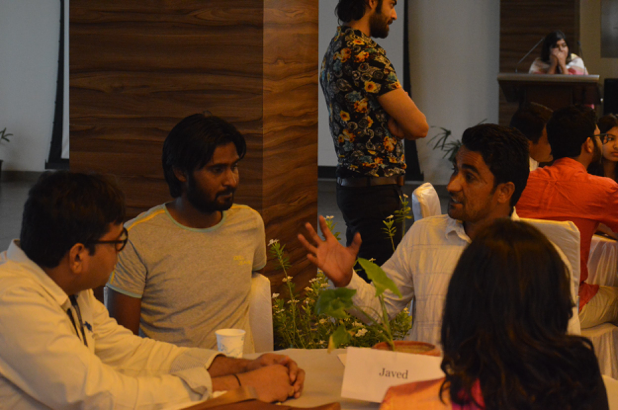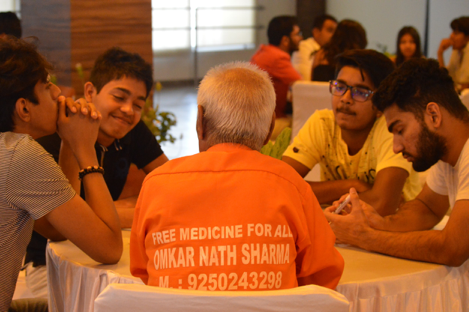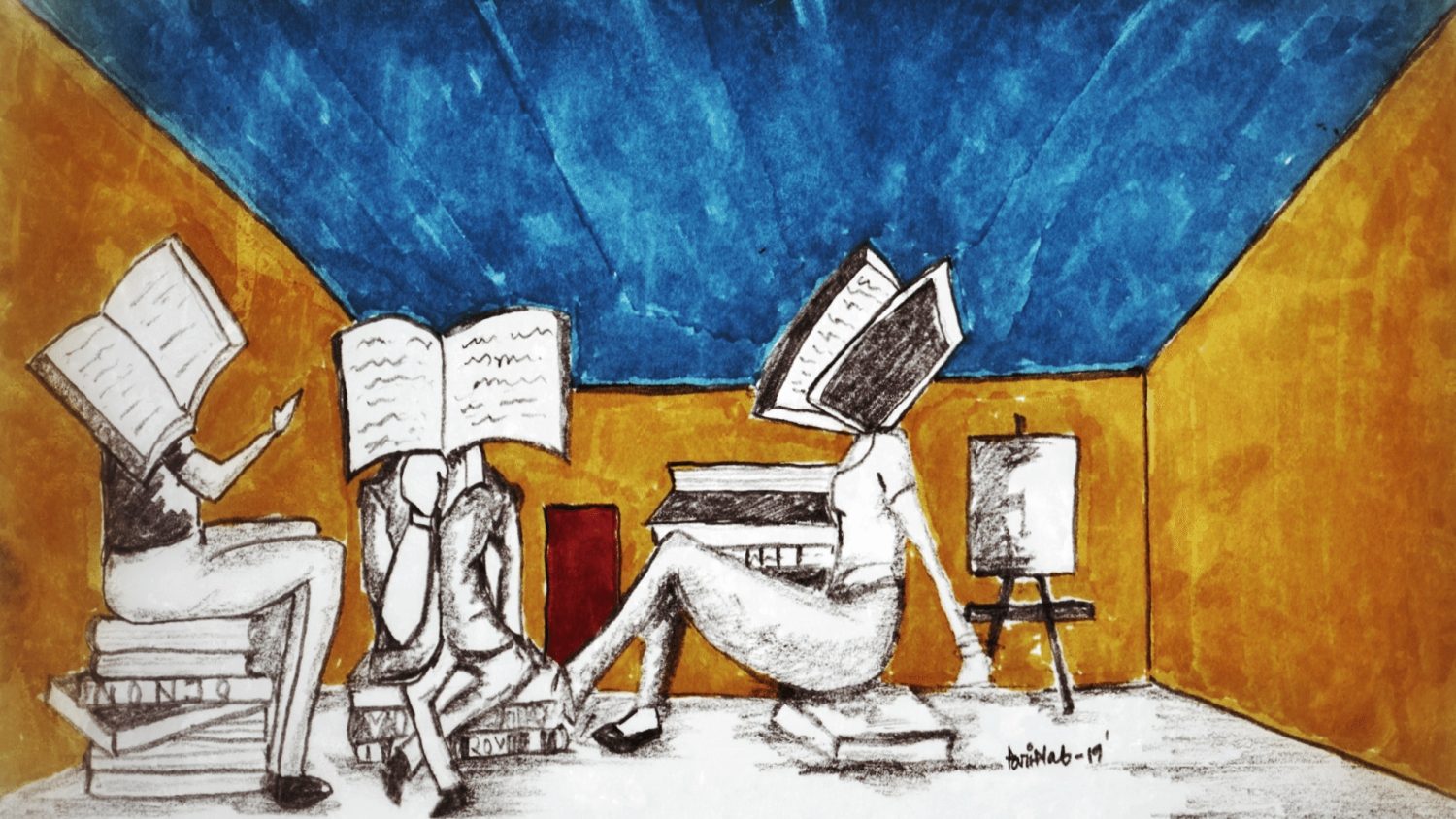The structure of a story typically comprises of 3 acts: the first introduces us to a routine and an inciting incident; the second talks about successes and failures –typically comprising a ‘turning point’, a ‘point of no return’ and a second ‘turning point’; finally, the third act concludes with a triumphant battle.
But when we find stories in people, these structures overlap. There are no ‘acts’ and the stories become more complex as they continuously engage with life.
So what do we know about the people around us? How do we engage with human ‘books’ and what prejudices have we attached to certain ‘characters’?
Stories about people
Javed Khan is a resident of the Mewat district in Haryana. His life was upended when a woman in his village accused his brother of rape. After several months of court proceedings and spending thousands of rupees in the process, the court gave his brother a clean chit and acquitted him of all charges. However, life would never be the same for him and his family.

Javed Khan (extreme right). Image credit: Prashasta Singh.
“Our lives have been destroyed permanently. We do not have any respect anymore,” he laments. “And we’re not the only ones. There are many such cases in our village where women threaten to slap false rape cases unless you pay a certain amount. Most people do, considering the immense damages that it can cause, even if you end up winning the case.”
Omkarnath Sharma is 82 years, 40% disabled and wears a bright orange kurta that in bold white letters reads, “Medicine Baba” along with his phone number. This inspiring old man, who was crippled at the young age of 12, took it upon himself to collect and distribute unused medicines to the poor for free.
“They call me ‘the poor man’s beggar’” he says. “I strongly believe that everyone should have access to medication and I will ensure that they do.” His exploits have earned him the name ‘Medicine Baba’ and the Delhi Gaurav Award in 2016.
Also read: ‘Always Remember Context, and Never Disregard Intent’: Should We Read More Empathetically?
Mr Khan and Mr Sharma were two of the few people who became ‘books’ and shared their incredible stories with participants or ‘readers’ at the inaugural Human Library event at Ashoka University on April 28, 2019.
The Human Library, a concept developed by Ronni Abergel at the Roskilde Festival in Copenhagen, is a place where a ‘book’ is a person who is placed on loan to ‘readers’ to narrate stories from his/her life. In the words of the parent organisation, “it is a framework that encourages positive and difficult conversations and where stereotypes and prejudices are actively challenged through dialogue.” Here, readers get a chance to ‘meet’ unconventional stories and engage with them.
Since its inception in 2000, the Human Library has grown to over a hundred chapters worldwide. The first Human Library in India was opened in Hyderabad with the cities of Delhi, Mumbai and Bangalore following suit. The Ashoka University chapter is one of the first in the country to be held independently by a university.
Conducted by a team of 15 students with administrative support from Ashoka University, the inaugural event featured ten books, including one honorary student book. The Human Library at Ashoka aimed at bringing books from all walks of life and was honoured to host a few well-known names as well.
Rounak Banik, the founder of the Ashoka chapter, said. “We had at least three guests who are extremely well-known in Delhi and have been covered by major news outlets like NDTV and Times of India. For instance, we were fortunate enough to have Neelam, a sarpanch from Haryana, as a book. Her work fighting ghoonghat has earned her several accolades and recognition from national media.”
The story of Neelam Sharma is an important and inspiring chapter on representation of women in politics.

Neelam Sharma. Image credit: Kunal Vaidya
Suffocated by the practice of not being able to speak in front of male members, Neelam became the mascot for the fight against ghoonghat. The practice is slowly fading from her village of Chhappar in Haryana. “The men in the village were initially very apprehensive about abolishing the practice. But I think they have wrapped their heads around the idea. I mingle with the male members from both sides of my family and call my husband by his first name. I feel like I, and all the women in my village can now voice their opinions better,” she said.
Books at the Human Library are uniquely recognised for representing groups in a community that has been stigmatised based on a set of predefined ‘pillars of prejudice’, including race, sex, age, disability, gender identity, lifestyle choices and class. As a liberal arts university that stands on the pillars of questioning singular narratives that dictate stereotypes and prejudices, the chapter at Ashoka university opened its library to hold books on some of the most stigmatised topics including mental health and sexual abuse.
Apart from Sharma, Khan, and Neelam, the guest list included Wamique Gajdhar, a bipolar disorder survivor and mental health advocate, Roopasa, an acid attack survivor, Pavel Sagolsem, a transgender activist, and Akshay Kapoor, a renowned photographer and a sexual abuse survivor and Girish Kurra, a.k.a Garry, a recovering substance dependent who now runs a rehabilitation center.

Roopa, works at Sheroes, a cafe run by acid attack survivors. Image credit: Prashasta Singh.
Enthusiastic readers
The event was attended by over 150 unique ‘readers’, with one reader coming all the way from Mumbai. Most readers stayed back to have conversations with at least three books.“Talking to them made me appreciate the diversity around me. It also made me realise how privileged I am,” says Sanya, a student from Jindal Global Law School. A human library event is always about the readers and the books.
In the 15 minutes that readers spend with a book in small, intimate groups, they engage with the book; they ask questions and share experiences. On seeing such great numbers, Ankita Borah, head of operations says, “To be very honest, we weren’t expecting a full house. But I’m glad that it turned out to be the success that it did. We had a trafficking victim and a former sex worker, who was a book at the event too, and in the last few minutes, one of her readers broke down into tears listening to her story and embraced her. I think this is a testimony to the kind of power this kind of event holds.”

Omkarnath Sharma (center, left) and Wamique Gajdhar (right, right) conversing with the readers. Image credit: Prashasta Singh
The core team hopes that this event is one of many to come. “We have planned a series of Humans of New York style posts coming out for all our books,” Banik said. “The majority of our team graduates this semester, but I’m confident that the library is in good hands and the graduates will continue to be associated with it. If all goes well, we should have a follow-up event sometime in August.”
On a Sunday afternoon at Ashoka University, a room turned into a library, people turned into books and reading into a conversation.
The Human Library is a concept that saw stories in people and it told the world, “here, have a read.” What space is more inviting, to challenge prejudices and start important conversations, than a library of people? At Ashoka University, over 150 ‘readers’ got an opportunity to challenge the prejudices they hold. This urges one to think, perhaps, the greater idea behind a library of this kind is to allow more people to come together, to question, to be questioned and to think about how the person next to them could be a story worth a read.
Abhinaya Murthy is a computer science engineer turned liberal arts student who loves books, film, music, and dogs. She is also a Young India Fellow and the head of design at Human Library Ashoka.
Featured image credit: Pariplab Chakraborty

